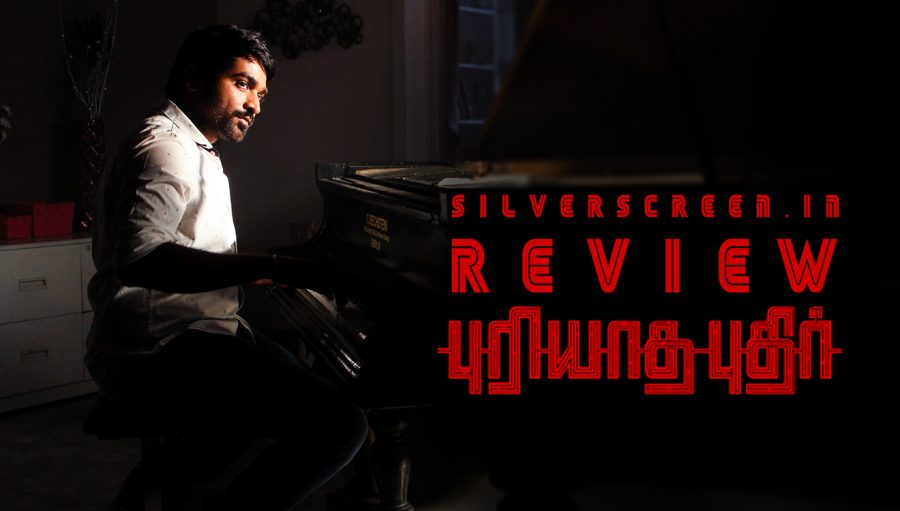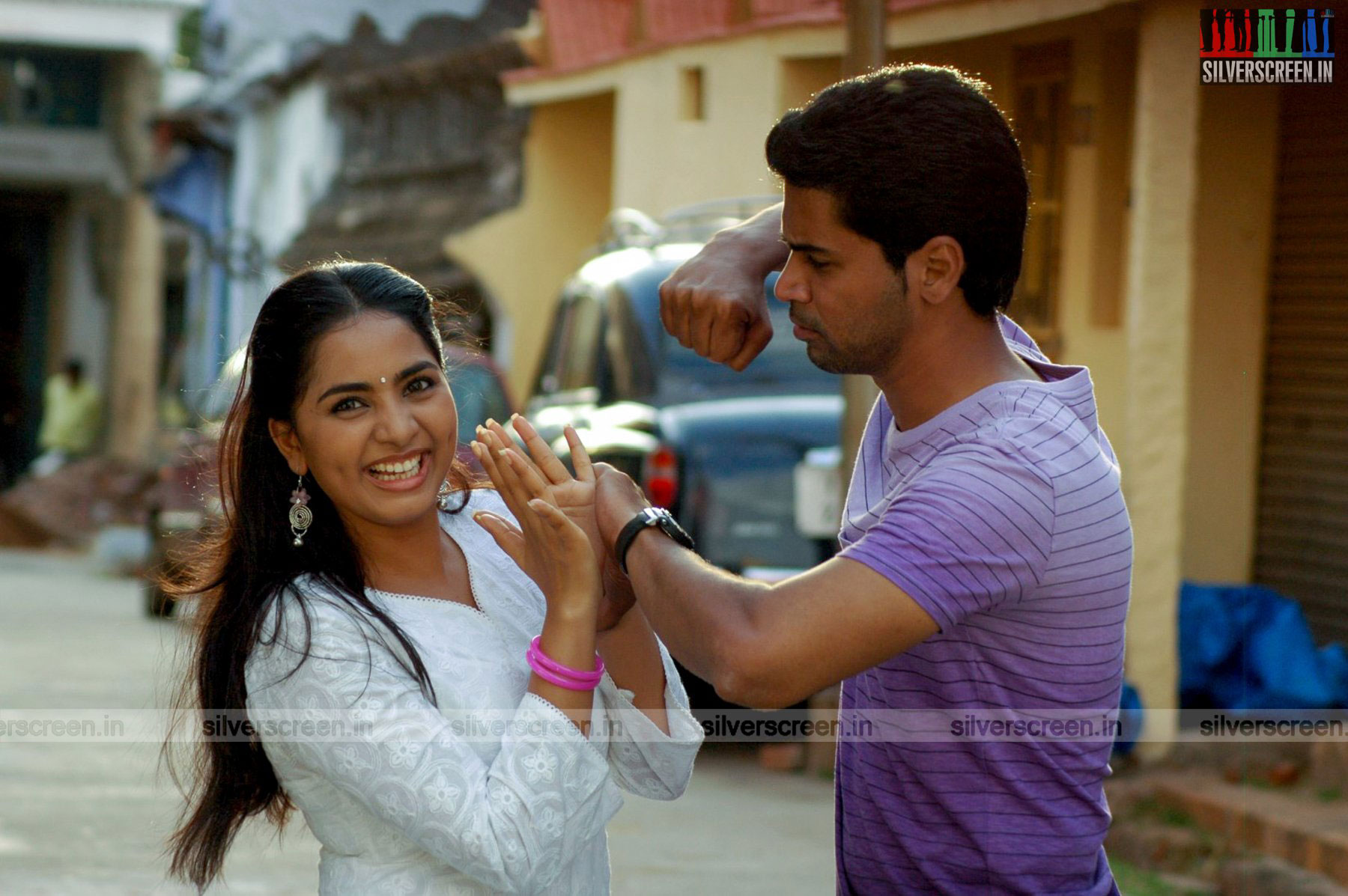Ranjith Jeyakodi’s Puriyatha Puthir — the unsolvable puzzle — is, given the recent “twist in the tail” films (looking at you Vikram Vedha), actually surprising in its reveal. The film, however, answers all the questions and solves the puzzle within its two-hour running time. Therefore the only big puzzle is, why did they choose that particular title?
This is even particularly puzzling, because the original title for the film was Mellisai (light music). Given that the two leads in the film are musicians, this would have made for a much better title. However, Puriyatha Puthir it became, and it is Puriyatha Puthir one must review.
*****
Puriyatha Puthir is a story about public shaming of women, non-consensual sharing of porn/voyeur videos, love, revenge, and loss. Starring Vijay Sethupathi, Gayathrie, Mahima Nambiar, and others, the film is written and directed by Ranjith Jeyakodi, and produced by Rebel Studios and JSK Films.
It was released on Friday (1 September), but some “technical issue” caused delays in screenings in some parts, but the film began running and seems to have picked up a fair bit of steam, going by the number of people in the hall, on a Monday afternoon, in Bengaluru.
*****
Kathir, played by Vijay Sethupathi, is an aspiring musician (one of Tamil cinema’s 1,000s). But more importantly, he is a man who lives by a strict moral code. His friends, Vinoth and DJ, are a lot less concerned about codes and ethics, and take their pleasure and thrills where they find it. Vinoth works for a television channel specialising in music, and has a special skill in having multiple affairs with women — all of whom he cheats on. DJ is, well, a DJ at a pub in Chennai, and drinks, dopes, and drugs.
Randomly, Kathir spots a young woman in a bus, and is struck by her beauty. Meera, played by Gayathrie, who teaches the violin, runs into Kathir, who manages a store selling musical instruments. Their paths cross a few times, enough for friendship and love to quickly follow each other. Everything is going swimmingly well. It’s Meera’s birthday, and in standard fashion, her boyfriend first pretends he doesn’t care, only to reveal a big surprise party later.
The next day, an anonymous person has flooded Facebook with photos and videos of Vinoth seducing his boss’ wife, and is fired from his job. Vinoth then takes his own life, and Kathir first learns of this anonymous stalker.
Very soon, Kathir gets secretly-filmed videos of Meera at a changing room in a store, at home, in the shower. By now, Kathir is desperate to find out who, and why, especially since a callous police force wants to be voyeur first, protectors later. Meera demands to know what is troubling Kathir, and he tells her. Meera then attempts suicide, and is rushed to a hospital where she recovers.
Kathir enlists the help of a young woman who works for the mobile operator, and discovers the name and address of the anonymous stalker. Someone called Mrithula, who lives in a posh house in Adyar. But there, he discovers that Mrithula has been dead for five years, and her irate father throws Kathir out on his ear.
DJ does his little investigation and discovers Mrithula’s father is/was a strict conservative parent, who shamed his daughter for falling in love, which eventually led to her suicide.
But soon, the police raid the pub in which DJ works, and arrest him for possession of drugs. We learn that the police have received a video from an anonymous number that prompts them to take action. DJ is to be in jail for six months. And once more, this anonymous stalker has hit Kathir and his friends.
Kathir receives one more video of Meera apparently alone at home and in the shower. He is told that the only thing that will stop the stalker from posting the video online is for Kathir to stand nearly naked in the rain, in full view of the public.
An altercation between Meera and Kathir follows, and Meera returns to her own flat. Where she is stalked, and abducted by a “crazy”, “creepy” neighbour. Kathir rescues her, and the police arrest the man, and everyone breathes a sigh of relief.
But no. The anonymous stalker resumes operation the next morning, and Kathir discovers the whole backstory. A flashback, and some crossed-paths later, we arrive at the climax.
*****
One of the things that’s struck me at the beginning of the film, was how jerky it was. We jumped from scene to scene — Kathir and friends, Kathir’s strict moral code, Kathir as a music store manager, Kathir as an aspiring music director, Kathir meeting Meera — with very little stay in these scenes. It felt like we were told not to sit down and watch the story unfold, but get up and run desperately towards the climax. Till Meera arrives, and the two of them begin their relationship, this jerkiness was unsettling. Then it sort of settles down and we see some longer scenes, more drawn out situations. So much so that even the anonymous stalker and the mystery and horror feels somehow, less anxiety inducing.
I don’t know if this was intentional, but it somehow worked. It carried me — perhaps all of us? — through to the reveal and the climax in a false sense of security. Perhaps we were made to feel that security and relief, just like Kathir was to. We were all Kathirs, and the writer and director had a surprise in store for us, just as Meera had for Kathir.
*****
But what perhaps should have been a clue (perhaps unintended clue?) to the intentions was that song sequence that closely follows the abduction and rescue of Meera from the crazy-stalker-neighbour.
A woman has just been rescued from a man who’s been following her for a long time (and we are shown this, and we are told this to be true), a man who abducts her, ties her up, and is perhaps intending to sexually assault her. Her lover then arrives, beat up the bad guy and hands him over to the police. Immediately after this, the woman begins to get frisky with her lover, and a slow, long, song sequence follows, at the end of which the two fall in bed in each others arms.
I thought there was something jarring in the psychology there, and that the first instinct of a woman in such a situation would not be to have sex with her lover. But the final denouement and the end followed and then the whole situation made better sense for me.
*****
There are some bits that don’t make much sense though. Why would the anonymous stalker — who we are told is fighting against non-consensual sharing of private videos — also perpetuate the same thing? As a writer and director, if Ranjith Jeyakodi wants us to sit up and take that message in — and clearly that was the intention behind the film — couldn’t he have written out a better “technique” for the stalker? If, otherwise, the motive was just revenge, why the heavy handed, legal text at the end?
Recommended
The other thing I don’t understand is why do Tamil cinema heroes lose their temper and scream at the women they love, for absolutely no reason at all? Is this an assertion of gender? Is this some register of manhood? The woman merely asked you why you were late, after you’ve told her to drop everything she is doing and be ready to flee the town. Keeping her in the dark, and shouting at her isn’t a response. Perhaps this is why the film’s called Puriyatha Puthir?
And my biggest grouse in the whole film: Why can’t the characters, who apparently are musicians, play the instruments they are supposedly experts at properly. Apart from the one instance of Vijay Sethupathi playing the guitar, (and clearly that was intended for marketing/promotion purposes, as the viral video would attest to) we never see any of the actors using their musical instrument of choice for more than a second. Which is perhaps the Puriyatha Puthir of Tamil cinema itself: Why don’t actors care enough?
*****
The Puriyatha Puthir review is a Silverscreen original article. It was not paid for or commissioned by anyone associated with the movie. Silverscreen.in and its writers do not have any commercial relationship with movies that are reviewed on the site.



